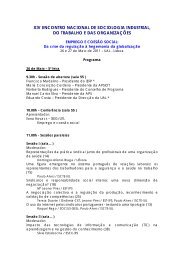Web-based Learning Solutions for Communities of Practice
Web-based Learning Solutions for Communities of Practice
Web-based Learning Solutions for Communities of Practice
Create successful ePaper yourself
Turn your PDF publications into a flip-book with our unique Google optimized e-Paper software.
common place (Hillery, 1955). The development<br />
<strong>of</strong> Internet and groupware technologies led to a<br />
new kind <strong>of</strong> community “virtual communities”<br />
where members can or not meet one another face<br />
to face and they may exchange words and ideas<br />
through the mediation <strong>of</strong> computers networks<br />
(Geib et al., 2004).<br />
This type <strong>of</strong> communities can be divided<br />
regarding their objectives and scope into<br />
socially-oriented, commercially-oriented and<br />
pr<strong>of</strong>essionally-oriented. We focus our research<br />
on the last one which consists <strong>of</strong> company employees<br />
who communicate and share in<strong>for</strong>mation<br />
to support their pr<strong>of</strong>essional tasks. An special<br />
case <strong>of</strong> pr<strong>of</strong>essionally-oriented communities are<br />
the “<strong>Communities</strong> <strong>of</strong> <strong>Practice</strong>” (CoPs) defined<br />
by Wenger et al. (2002) as groups <strong>of</strong> people who<br />
share a concern, a set <strong>of</strong> problems, or a passion<br />
about a topic, and who deepen their knowledge<br />
and expertise in this area by interacting on an<br />
ongoing basis.<br />
Regarding a knowledge point <strong>of</strong> view CoPs<br />
share values, beliefs, languages, and ways <strong>of</strong> doing<br />
things many companies report that CoPs help<br />
reduce problems due to lack <strong>of</strong> communication,<br />
and save time by “working smarter” (Wenger,<br />
2002). Millen et al. (2002) discuss the costs and<br />
benefits <strong>of</strong> CoPs in a study <strong>of</strong> seven large, geographically<br />
dispersed organizations. The study<br />
indicates benefits on individual, community<br />
and organizational level, like increased access<br />
to experts and in<strong>for</strong>mation resources, increased<br />
idea generation and better problem solving, to<br />
indications <strong>of</strong> more successfully executed projects<br />
and product innovations. Moreover, individuals<br />
are frequently more likely to use knowledge built<br />
by their community team members than that created<br />
by members outside their group (Desouza<br />
et al, 2006), that is, they are more likely to share<br />
knowledge with people they trust. However, since<br />
in current CoPs people are usually geographically<br />
dispersed they do not have a face to face communication<br />
and this situation could be a problem since<br />
the level <strong>of</strong> trust between members can decrease<br />
232<br />
An Agent System to Manage Knowledge in CoPs<br />
and in consequence there could be a lower level<br />
<strong>of</strong> sharing knowledge.<br />
On the other hand, even though CoPs are a<br />
focus <strong>of</strong> knowledge sharing hardly ever there is<br />
any quality control <strong>of</strong> the knowledge generated<br />
in the community. Our proposal is to use agent’s<br />
technology to foster knowledge exchange at communities<br />
<strong>of</strong> practice and to evaluate the suitability<br />
<strong>of</strong> knowledge shared.<br />
AGENTS AND TRUST<br />
Because <strong>of</strong> the importance <strong>of</strong> knowledge management,<br />
tools to support some <strong>of</strong> the tasks related<br />
to knowledge management have been developed.<br />
Different techniques are used to implement these<br />
tools. One <strong>of</strong> them, which is providing to be quite<br />
useful, is that <strong>of</strong> intelligent agents (van-Elst et al,<br />
2003). S<strong>of</strong>tware agent technology can monitor<br />
and coordinate events, meetings and disseminate<br />
in<strong>for</strong>mation (Balasubramanian et al, 2001).<br />
Furthermore, agents are proactive; this means<br />
they act automatically when it is necessary. The<br />
autonomous behavior <strong>of</strong> the agents is critical<br />
to the goal <strong>of</strong> this research since agents help to<br />
reduce the amount <strong>of</strong> work that employees have<br />
to per<strong>for</strong>m, <strong>for</strong> instance searching in<strong>for</strong>mation in<br />
a knowledge base. On the other hand one <strong>of</strong> the<br />
main advantages <strong>of</strong> the agent paradigm is that it<br />
constitutes a natural metaphor <strong>for</strong> systems with<br />
purposeful interacting agents, and this abstraction<br />
is close to the human way <strong>of</strong> thinking about<br />
their own activities (Wooldridge & Ciancarini,<br />
2001). This foundation has led to an increasing<br />
interest in social aspects such as motivation, leadership,<br />
culture or trust (Fuentes et al, 2004). Our<br />
research is related to this last concept <strong>of</strong> “trust”<br />
since artificial agents can be made more robust,<br />
resilient and effective by providing them with<br />
trust reasoning capabilities.<br />
For agents to function effectively in a community,<br />
they must ensure that their interactions with<br />
the other agents are trustworthy. For this reason



